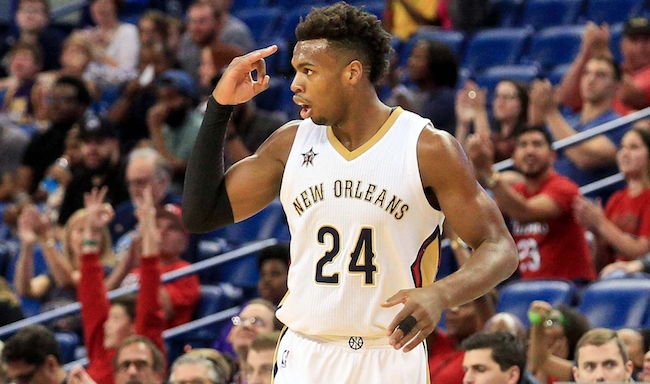The early returns on Joel Embiid so far this preseason have been promising, to say the least. And with Ben Simmons out indefinitely (possibly the entire season?), Embiid could emerge as the favorite to take home Rookie of the Year honors. The only problem with that is the Sixers’ front office wants to take a cautious approach as the 7-foot-2 center works his way back from multiple foot injuries that have postponed his NBA debut for two full seasons.
Philadelphia has already announced that he likely won’t play on back-to-back nights, and now coach Brett Brown has offered a rather conservative estimate of how much playing time Embiid might log this season.
Embiid to play 12 minutes tomorrow, Brown would like 20-24 for the regular season.
— Jessica Camerato (@JessicaCamerato) October 10, 2016
That begs the question whether Embiid will be on the court long enough to put up the type of numbers he’ll need to win the award. For comparison, reigning ROY Karl-Anthony Towns averaged 32 minutes per game last season in a starting role, but he was also essentially the runaway favorite. Fellow teammate Andrew Wiggins averaged 36 minutes the season before that when he won the award.
So it’s a legitimate question. When Vegas set the odds immediately following last summer’s draft, they put Buddy Hield right behind Simmons, followed by Brandon Ingram, Kris Dunn (who fellow rookies picked as the favorite to win the award), Jamal Murray, and Denzel Valentine.

The Lakers recently announced that Ingram will come off the bench to start the season, which could put him in the same predicament as Embiid. Dunn is in the unfortunate position of not only having to beat out incumbent point guard Ricky Rubio for the starting job, but curry Tom Thibodeau’s favor in the process. The list only gets dicier and more nebulous from there.
Hield has a real opportunity to win the starting job in New Orleans, which could give him a decisive edge, but it also bears mentioning that the Vegas oddsmakers are rarely correct in their predictions. The NBA world has grown savvier about evaluating players for their overall impact during their on-court time, regardless of length. Per-36 minute stats are a helpful assessment tool, for instance, although they don’t necessarily offer a solid projection of how a player will perform given increased minutes.
But if Embiid can stay healthy — and if Sixers brass can come to a resolution regarding their logjam in the frontcourt — he could see increased playing time as the season progresses and establish himself as the candidate to beat. Of course, it’s obviously far too early for this type of prognosticating, and a lot of terrible and wonderful things could happen between now and next spring that could make us all once again re-evaluate how much we thought we know about this sport.
